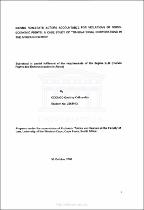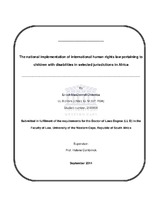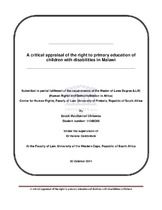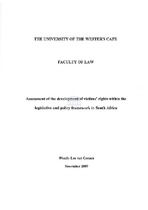| dc.contributor.advisor | Van Reenen, Tobias | |
| dc.contributor.author | Odongo, Godfrey Odhiambo | |
| dc.date.accessioned | 2023-06-23T09:11:50Z | |
| dc.date.available | 2023-06-23T09:11:50Z | |
| dc.date.issued | 2002 | |
| dc.identifier.uri | http://hdl.handle.net/11394/10340 | |
| dc.description | Magister Legum - LLM | en_US |
| dc.description.abstract | The development of a common standard for holding governments accountable for
human rights violations represented by international human rights law (IHRL) has been
one of the major achievements of international law. However, two conspicuously narrow
foci marked and continue to mark this development. Firstly, IHRL has focused
predominantly on civil and political rights to the exclusion of economic, social and
cultural rights. Indeed, in this regard it has been observed that "of all domains were
state and inter-governmental action have failed to achieve anything more than modest
success, the development of effective measures for the prevention and remedying of
violations of economic, social and cultural rights (ESCRs) must surely classify as one of
the most glaring". | en_US |
| dc.language.iso | en | en_US |
| dc.publisher | University of the Western Cape | en_US |
| dc.subject | Socio economic rights | en_US |
| dc.subject | Civil rights | en_US |
| dc.subject | Africa social justice | en_US |
| dc.subject | Africa Human rights | en_US |
| dc.subject | African Charter on Human and Peoples' Rights | en_US |
| dc.title | Making non-state actors accountable for violations of economic rights: a case study of transnational corporations in the African context | en_US |
| dc.rights.holder | University of the Western Cape | en_US |




